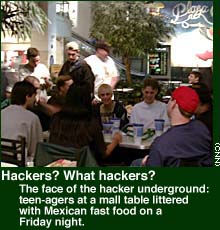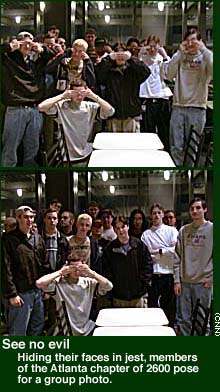The following is an account of an informal, public meeting of self-described hackers. This article is an account of the event, not an endorsement of hacking.
(CNN) -- It's Friday night, and the hackers are out. At the mall.
The Atlanta chapter of 2600, a loosely knit international organization of self-described hackers, meets in the food court of Lenox Square, a huge Atlanta shopping mall. Their meetings are planned and publicized -- first Friday of the month, some time between 6 and 8 p.m.
Few of the 20 or so participants at this meeting refuse to be photographed, though all give their online handles rather than real names. That's not just because there's a reporter present; it's par for the course.
"Some of these guys know my real name, some don't," shrugs Low Tek, one of the more outspoken members of the group.
The group looks like it could be in a high school or college cafeteria: its members are overwhelmingly young, and they come in a variety of shapes, sizes, clothes and hair lengths. JLee, a visitor from Chattanooga, has spiky, fuschia hair. Squirrel, a tall, heavyset young man, wears a T-shirt with an anatomically explicit photo of a squirrel. Several have piercings, but nothing particularly startling.
If this does not fit your notion of hackers, that's part of the point. The consensus among the 2600ers is that the mass media -- and people who get their information from the mass media -- Just Don't Get It. Press coverage is "more to scare you than it is to inform you nowadays," Low Tek says.
|
Aside from "They Just Don't Get It," there are few points of universal assent among hackers. This is an anarchic, argumentative group, the atmosphere polite but contentious. The first of many arguments, and the first of many to remain unresolved, is over the fundamental question of what a hacker is.
'A bunch of different meanings...'
"The word 'hacker' has a bunch of different meanings," one participant says. A bunch of different meanings are then offered.
"Most hackers in the scene today are ... White Hats," one says. "They don't break into systems."
"That's bull----," counters JLee. "Hacking is hacking. Hacking means breaking into systems."
Whatever a hacker is, the consensus is that a "hacker ethic" exists. Hackers are driven by curiosity, exploring computers the way kids climb over fences. "Hacking, at its basic level, is the pursuit of knowledge," Dos Spider says. "How does it work?"
In the broadest sense, "hacking" means digging for information in ways the holders of information never intended -- JLee mentions Abbie Hoffman's "Yippies" of the 1960s as an influence. The hacker is an ordinary person who, for once, has an advantage over the system -- "It's someone watching the watchers, basically," says Empress.
But hacking, they say, is not stealing; there's a general scorn for computer criminals who abuse the knowledge developed by "real" hackers. The people who break into machines to steal are often labeled "Black Hats" -- though, again, there's no consensus on the definition.

Social engineering: Are you being hacked?
Several of the hackers mention "social engineering," a high-tech name for the ancient process of asking questions. "When I talk to you, and I get you to say information, I'm hacking your brain," Low Tek says. "When you shook my hand, I was social engineering you."
"Uh-oh, you've been hacked," a bystander laughs.
"The only true form of hacking that's still going to be here when computers come to an end is social engineering," Low Tek says. "There's always going to be a weak link in the chain -- it's always going to be operated by a human."
Lithium says credit card security, a common worry on the Internet, is an illusion even for those who don't own a computer.
"If someone wants to get your credit card information, they're going to get it, whether you like it or not," says Lithium, one of the youngest-looking members of the group.
"It is scary," he says, though he seems more resigned than frightened.
Who's watching the hackers?
The philosophy that information is inherently insecure breeds an odd sort of paranoia -- not the fear of being watched, but a near-certainty.
Throughout the meeting, rumors surface: People spotted lurking nearby are recognized from past meetings and marked as plainclothes mall security, local police or even feds. 2600ers have become more attentive to such signs since The Incident.
The Incident, as it is called, was a 2600 meeting whose participants were hassled by security and run out of the mall, accused of trading pornography. "Some people today believe that it was a way to get pictures [of group members], or a way to get names," Low Tek says. "Other people just think it was a misunderstanding."
There's a strong sense of hacker history here, a belief that the best days of hacking have come and gone. "The '80s to early '90s were definitely the Golden Age," Low Tek says. "It was before everybody started locking down ... before security started getting smart."
"Any one of us here would give a ... pint of blood to live in the early '80s with the knowledge that we have now," Low Tek says.

Hacking Hollywood, and the cyberpolitics of gender
Favorite hacker movies among hackers? "Sneakers" is a hands-down choice, followed by "WarGames" as a time capsule of the Golden Age. The recent film "Hackers" is blasted in every respect except the casting of Angelina Jolie. Which brings up another observation -- the hackers at this meeting were nearly all male.
"Being a woman in this type of thing, you get recognized all the time," says Empress, the only woman at the meeting. "I've been coming to these meetings for a long time ... since '95."
Had there not been a reporter present, the 2600ers say, the meeting would have been a primarily social event. "Some of these guys here, I'll hang out at a club, go to a rave with, do the occasional drug..." Low Tek says.
"We didn't come here as part of some big scheme to overthrow the government like everyone thinks," Lithium says. "That's what my Mom thought."
As the meeting breaks up, Low Tek gets down to business: "So, what's everybody doing tonight?"
It is, after all, Friday night.
http://www.cnn.com/TECH/specials/hackers/culture/